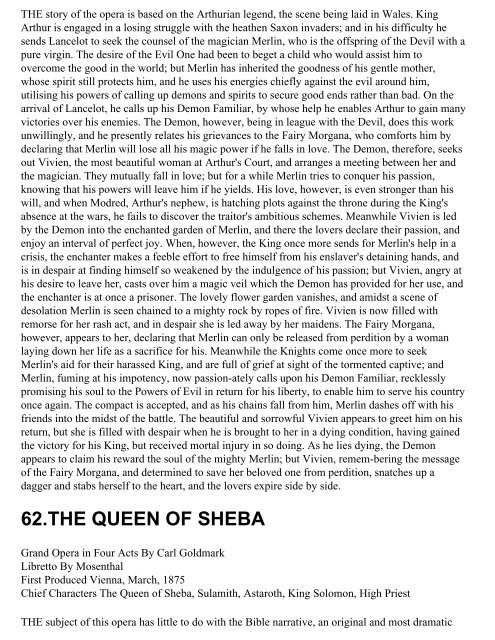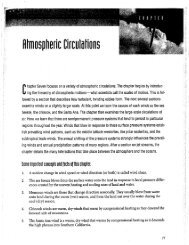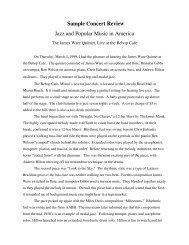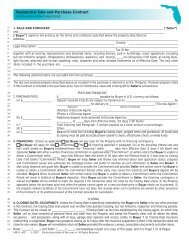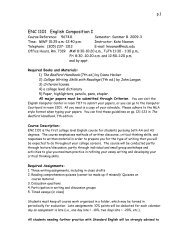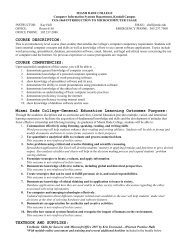Opera Plots I - MDC Faculty Home Pages
Opera Plots I - MDC Faculty Home Pages
Opera Plots I - MDC Faculty Home Pages
You also want an ePaper? Increase the reach of your titles
YUMPU automatically turns print PDFs into web optimized ePapers that Google loves.
THE story of the opera is based on the Arthurian legend, the scene being laid in Wales. King<br />
Arthur is engaged in a losing struggle with the heathen Saxon invaders; and in his difficulty he<br />
sends Lancelot to seek the counsel of the magician Merlin, who is the offspring of the Devil with a<br />
pure virgin. The desire of the Evil One had been to beget a child who would assist him to<br />
overcome the good in the world; but Merlin has inherited the goodness of his gentle mother,<br />
whose spirit still protects him, and he uses his energies chiefly against the evil around him,<br />
utilising his powers of calling up demons and spirits to secure good ends rather than bad. On the<br />
arrival of Lancelot, he calls up his Demon Familiar, by whose help he enables Arthur to gain many<br />
victories over his enemies. The Demon, however, being in league with the Devil, does this work<br />
unwillingly, and he presently relates his grievances to the Fairy Morgana, who comforts him by<br />
declaring that Merlin will lose all his magic power if he falls in love. The Demon, therefore, seeks<br />
out Vivien, the most beautiful woman at Arthur's Court, and arranges a meeting between her and<br />
the magician. They mutually fall in love; but for a while Merlin tries to conquer his passion,<br />
knowing that his powers will leave him if he yields. His love, however, is even stronger than his<br />
will, and when Modred, Arthur's nephew, is hatching plots against the throne during the King's<br />
absence at the wars, he fails to discover the traitor's ambitious schemes. Meanwhile Vivien is led<br />
by the Demon into the enchanted garden of Merlin, and there the lovers declare their passion, and<br />
enjoy an interval of perfect joy. When, however, the King once more sends for Merlin's help in a<br />
crisis, the enchanter makes a feeble effort to free himself from his enslaver's detaining hands, and<br />
is in despair at finding himself so weakened by the indulgence of his passion; but Vivien, angry at<br />
his desire to leave her, casts over him a magic veil which the Demon has provided for her use, and<br />
the enchanter is at once a prisoner. The lovely flower garden vanishes, and amidst a scene of<br />
desolation Merlin is seen chained to a mighty rock by ropes of fire. Vivien is now filled with<br />
remorse for her rash act, and in despair she is led away by her maidens. The Fairy Morgana,<br />
however, appears to her, declaring that Merlin can only be released from perdition by a woman<br />
laying down her life as a sacrifice for his. Meanwhile the Knights come once more to seek<br />
Merlin's aid for their harassed King, and are full of grief at sight of the tormented captive; and<br />
Merlin, fuming at his impotency, now passion-ately calls upon his Demon Familiar, recklessly<br />
promising his soul to the Powers of Evil in return for his liberty, to enable him to serve his country<br />
once again. The compact is accepted, and as his chains fall from him, Merlin dashes off with his<br />
friends into the midst of the battle. The beautiful and sorrowful Vivien appears to greet him on his<br />
return, but she is filled with despair when he is brought to her in a dying condition, having gained<br />
the victory for his King, but received mortal injury in so doing. As he lies dying, the Demon<br />
appears to claim his reward the soul of the mighty Merlin; but Vivien, remem-bering the message<br />
of the Fairy Morgana, and determined to save her beloved one from perdition, snatches up a<br />
dagger and stabs herself to the heart, and the lovers expire side by side.<br />
62.THE QUEEN OF SHEBA<br />
Grand <strong>Opera</strong> in Four Acts By Carl Goldmark<br />
Libretto By Mosenthal<br />
First Produced Vienna, March, 1875<br />
Chief Characters The Queen of Sheba, Sulamith, Astaroth, King Solomon, High Priest<br />
THE subject of this opera has little to do with the Bible narrative, an original and most dramatic


